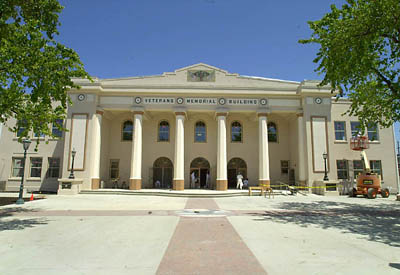Last Wednesday was the 70th anniversary of the 1941 attack on Pearl Harbor by the Empire of Japan and the local American Legion and VFW sponsored memorial ceremonies and an informal dinner in honor of the World War II veterans. Appropriately, it was at Hollister’s Veterans Memorial Building and a surprising 26 World War II vets attended the event, and I made it too. I came to honor all the vets and in memory of my Dad who served during WWII although not overseas; my father-in-law who spent 3-1/2 years in Japanese POW and labor camps only to die shortly after war’s end; and my father’s cousin, age 24, who was killed in 1942 during the sea battles off Guadalcanal.
Those are three typical war stories from one family, my family – the vets had many more. One thing that strikes you about the WWII vets is how ordinary-extraordinary they are. That is probably because they represented such a broad swath of the nation’s population, which was only 135 million in 1942. They served and most survived, came back and got busy living and did a very good job of it for the most part. The majority were able to put it all into perspective, somehow.
The hosts included some Korean War and many Vietnam-era vets and one cannot fail to notice the differences between the groups in the public’s eye. The nation seems to hold a special reverence for the WWII survivors. We have amnesia for the Koran War vets, forgotten men and women of a forgotten war, and a mere tolerance for the Vietnam-era vets as if we do not want to be reminded of that war. When surveyed, 87 percent of the public now holds Vietnam veterans in high esteem, nothing to crow about.
Those figures are a vast improvement over previous views, but it has taken more than 35 years to get to this point. In his 1979 Veterans Day remarks, Max Cleland, then administrator of veterans affairs, reported a survey “found that an overwhelming percentage of people are now willing to separate the warriors from the war.” He also reported that: “Public sympathy for the plight of Vietnam era veterans seems to have increased since 1971.” However, by 1979, five years after the war was essentially over, the sentiment that the Vietnam vets had been treated badly had risen to only 64 percent, but why so little so late?
The truth is those are depressing numbers and it only takes only a minute of seeing the groups together to remind me of how poorly the nation treated the both the Korean War and Vietnam vets. The vast majority of Americans served with honor and courage during the both wars, doing their duty in the best traditions of the United States and its military services – and while the fictions of WWII have been overwhelmingly positive, the fictions of the Korean and Vietnam wars have been overwhelmingly negative.
There is no reason for this attitude; we did not win either war in the traditional sense, but very little of that, if any, is directly attributable to the troops. Now that the surviving WWII vets are entering the deep twilight of their years, it is about time we put the veterans of the Korean War and Vietnam War in the sunshine where they always belonged.
Welcome home – you have the thanks of a grateful nation.
Marty Richman is a Hollister resident.









